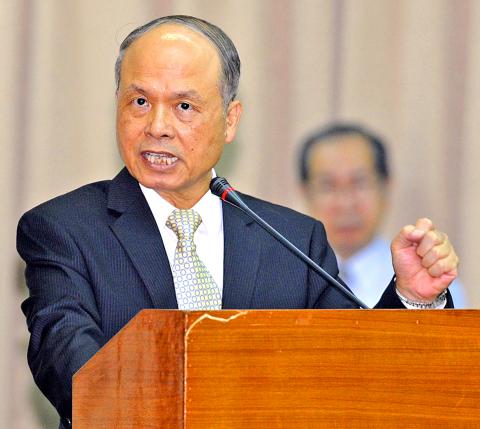The Ministry of Finance yesterday urged Ting Hsin International Group (頂新國際集團) to liquidate its shares in Taipei Financial Center Corp (TFCC, 台北金融大樓公司), one day after successfully pressuring the food manufacturer to surrender management rights at the firm that operates Taipei 101.
“We hope Ting Hsin will sell its shares in TFCC to meet the wishes of the public in the wake of the tainted cooking oil scandal,” Minister of Finance Chang Sheng-ford (張盛和) told a meeting of the legislature’s Finance Committee in Taipei.
On Tuesday, the conglomerate’s chairman Wei Ying-chiao (魏應交) resigned from his posts as TFCC vice chairman and president, but retained the firm’s seats on the board on the back of the group’s 37.17 percent stake in the company.

Photo: Chen Chih-chu, Taipei Times
Angry consumers have pressed Ting Hsin to exit the company that runs the landmark skyscraper and the local market altogether, after its affiliated companies were suspected of adulterating cooking oil for years to cut costs.
The ministry intends to raise its stake in TFCC to more than 50 percent, from 44 percent, giving it majority control over policymaking decisions, Chang said.
While Ting Hsin has the freedom to plan its own asset allocations, the ministry can exert influence through tax inspections and credit controls, Chang said.
The ministry owns significant stakes in eight lenders and has scheduled a meeting for tomorrow to review Ting Hsin’s credit profile, the minister said.
The group owes NT$48 billion (US$1.58 billion) in outstanding loans to local banks that have agreed in principle to honor existing loans, but not to approve new loans.
The group has canceled loan applications to finance the acquisition of a cable TV operator, China Network Systems Co (中嘉網路), as well as a land development project in New Taipei City’s Sanchong District (三重), the lenders said.
State-run banks can buy the shares owned by Ting Hsin if it is willing to sell, Chang said, adding that it would be difficult to deny the conglomerate seats on the board otherwise.
The Changhua County-based group may rake in a hefty profit from selling its TFCC shares that it purchased five years ago at NT$13 per share as the price has risen to NT$42, local media reported.
Financial Supervisory Commission Chairman William Tseng (曾銘宗) voiced reservations about the harsh credit control measures aimed at Ting Hsin over concern the move may destroy both the company and the stability of the financial sector.
Tseng said he helped talk Wei into giving up his positions at TFCC on Tuesday after Wei initially refused to resign.
“I suggested he resign as fast as possible given the public anger about Ting Hsin,” Tseng said, adding that the government could have ousted him through a vote if necessary.

The US government has signed defense cooperation agreements with Japan and the Philippines to boost the deterrence capabilities of countries in the first island chain, a report by the National Security Bureau (NSB) showed. The main countries on the first island chain include the two nations and Taiwan. The bureau is to present the report at a meeting of the legislature’s Foreign Affairs and National Defense Committee tomorrow. The US military has deployed Typhon missile systems to Japan’s Yamaguchi Prefecture and Zambales province in the Philippines during their joint military exercises. It has also installed NMESIS anti-ship systems in Japan’s Okinawa

TRAGEDY STRIKES TAIPEI: The suspect died after falling off a building after he threw smoke grenades into Taipei Main Station and went on a killing spree in Zhongshan A 27-year-old suspect allegedly threw smoke grenades in Taipei Main Station and then proceeded to Zhongshan MRT Station in a random killing spree that resulted in the death of the suspect and two other civilians, and seven injured, including one in critical condition, as of press time last night. The suspect, identified as a man surnamed Chang Wen (張文), allegedly began the attack at Taipei Main Station, the Taipei Fire Department said, adding that it received a report at 5:24pm that smoke grenades had been thrown in the station. One man in his 50s was rushed to hospital after a cardiac arrest

ON ALERT: Taiwan’s partners would issue warnings if China attempted to use Interpol to target Taiwanese, and the global body has mechanisms to prevent it, an official said China has stationed two to four people specializing in Taiwan affairs at its embassies in several democratic countries to monitor and harass Taiwanese, actions that the host nations would not tolerate, National Security Bureau (NSB) Director-General Tsai Ming-yen (蔡明彥) said yesterday. Tsai made the comments at a meeting of the legislature’s Foreign Affairs and National Defense Committee, which asked him and Minister of National Defense Wellington Koo (顧立雄) to report on potential conflicts in the Taiwan Strait and military preparedness. Democratic Progressive Party (DPP) Legislator Michelle Lin (林楚茵) expressed concern that Beijing has posted personnel from China’s Taiwan Affairs Office to its

PUBLIC SAFETY: The premier said that security would be tightened in transport hubs, while President Lai commended the public for their bravery The government is to deploy more police, including rapid response units, in crowded public areas to ensure a swift response to any threats, President William Lai (賴清德) said yesterday after a knife attack killed three people and injured 11 in Taipei the previous day. Lai made the remarks following a briefing by the National Police Agency on the progress of the investigation, saying that the attack underscored the importance of cooperation in public security between the central and local governments. The attack unfolded in the early evening on Friday around Taipei Main Station’s M7 exit and later near the Taipei MRT’s Zhongshan